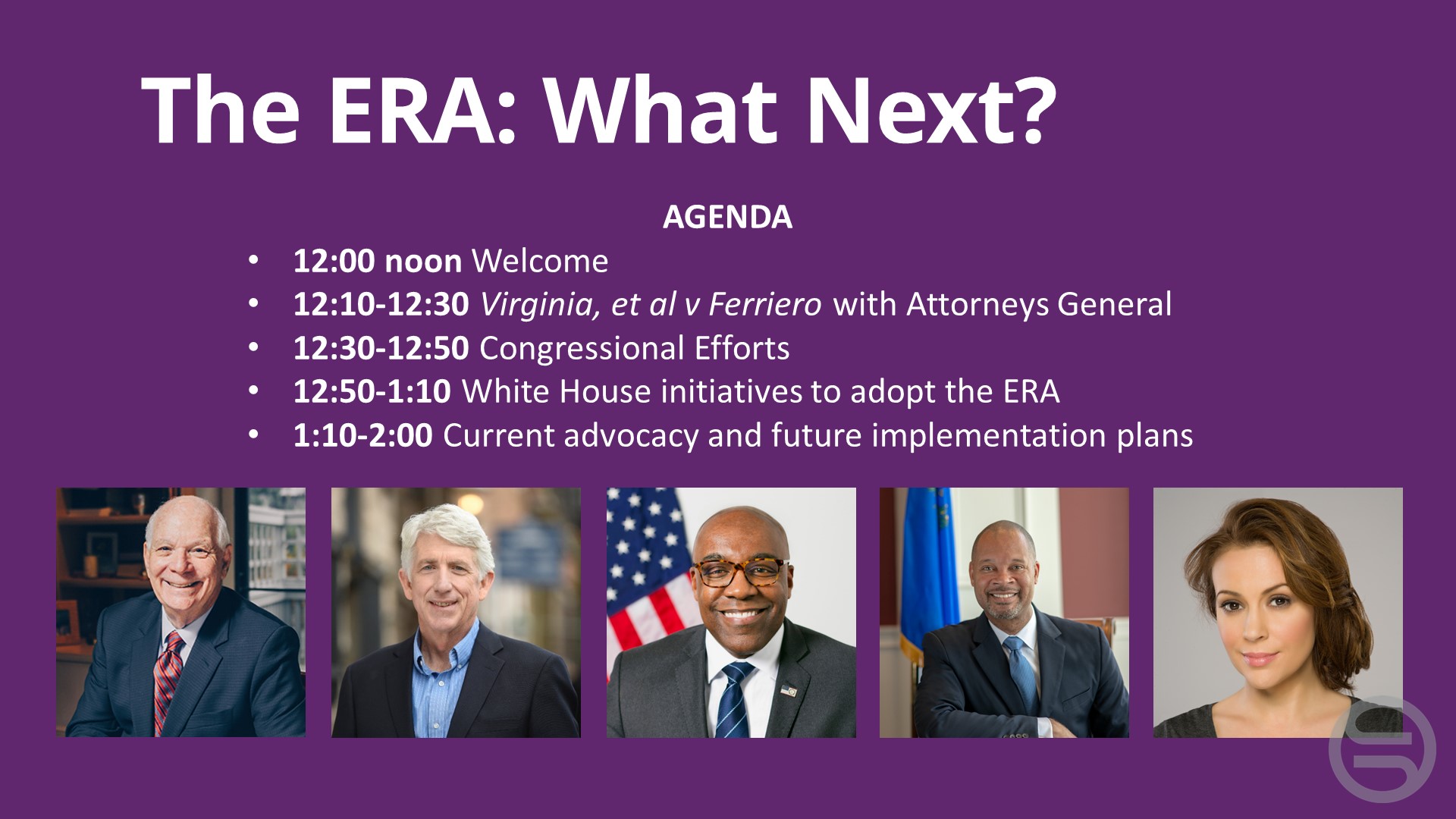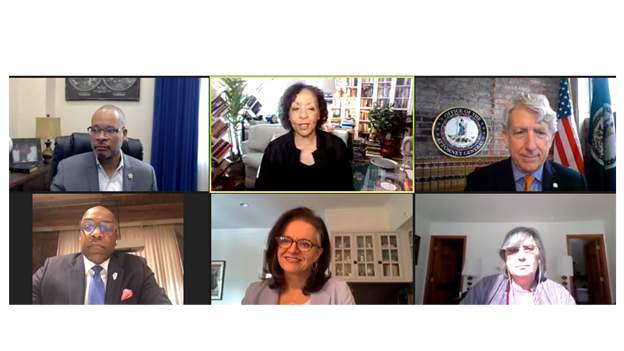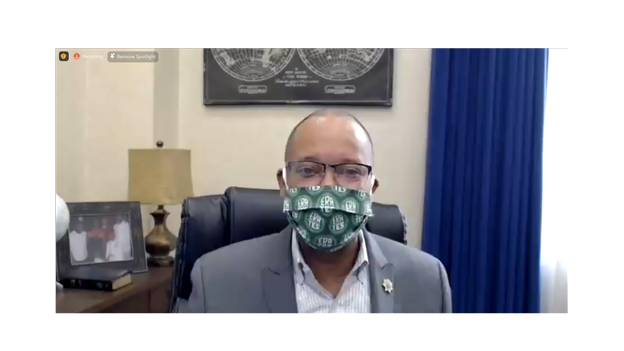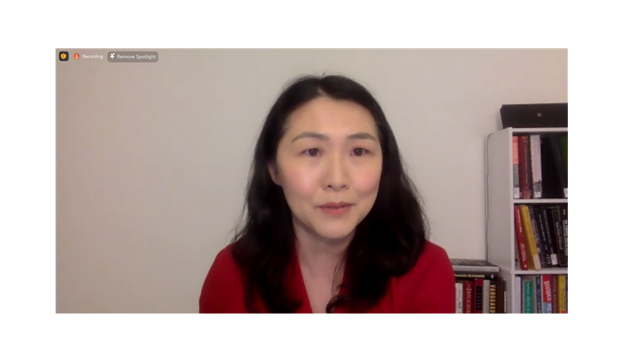Why We’re Still Fighting for the Equal Rights Amendment
October 09, 2024
A Discussion Recap

At noon EST on Tuesday, the ERA Coalition convened a briefing of coalition organizations, leaders, and elected officials to talk about the current status of the Equal Rights Amendment, and what the next step for the movement should be. The discussion was supported in part by funding from the Harnisch Foundation.
The meeting was kicked off by Kimberly Peeler-Allen, Chair of the ERA Coalition board, and Mona Sinha, Chair of the Fund for Women’s Equality board. Both women made the case to almost 100 attendees that this was our chance to finally get the Equal Rights Amendment over the finish line, and truly create the space for democracy and the opportunities for all to thrive.
Alyssa Milano, activist and ERA Advisory Board member reminded everyone that although we are on the cusp of having equal rights for women in the Constitution, we’re still living in a world of uncertainty because of a likely Senate filibuster. She drove home the importance of meetings like the one on Tuesday so we could strategize together – and reminded everyone that “we need to fight even harder now.”
Carol Jenkins, President and CEO of the ERA Coalition/Fund for Women’s Equality, representing over 120 partners, looks forward to doing the work to put equality into practice. But having met the requirements in the Constitution to codify equal rights, Jenkins pointed out we’re still waiting for the National Archivist to certify the Amendment.
Discussion on Virginia, et al v Ferriero court case
She then introduced the three Attorneys General who filed the brief against the Archivist in the Virginia, et al v Ferriero court case.

Virginia Attorney General Mark Herring spoke first, representing the 38th and final state required to ratify the ERA last year on Jan 27, 2020. In a fight for true equality that started with the founding of the nation, Herring said the constitution will finally include women in “equality for all”. He reminded attendees that for our first 150 years we didn’t acknowledge women in the Constitution at all, and then it was only in the context of expanding the right to vote.
“The ERA is the 28th amendment to the constitution, and the U.S. will never again treat women as second-class citizens.” “The forces that have tried to deny women equal protection under the law for centuries have not been vanquished yet – but women will go over those roadblocks, around them, whatever they need to do.”
Herring spoke on behalf of the Attorneys General when he said that Trump Administration tried to nullify the will of millions of Americans speaking their voice. The three AGs filed suit against the Archivist in the District Court in Washington, D.C. to ensure the ERA is recognized, and that the declaration is a valid amendment of the Constitution, and that the archivist should see to his ministerial duty. “We’ve received support from around the country, which is critical in the fight because the weight of history is with us.” Herring acknowledged that Virginia has often been on the wrong side of civil rights in the past (see Loving v Virginia, Barbara Johns’ case becoming part of Brown v Board of Education, and the case against Virginia Military Institute in the 1990s). “But we've gotten a whole different vision of how an AG should be on the side of the people with regard to civil rights.”
Herring then shared his own personal story of being raised with his sister by a single mother, both of whom were fierce advocates of the ERA when he was growing up. The hardships his mother experienced still resonated with him as he concluded, “Women still experience discrimination every single day, and the ERA does matter to the millions of women who experience this…Equality is always worth fighting for.”
Illinois Attorney General Kwame Raoul, representing the 37th state to ratify the ERA, mentioned he was currently snowed in with his daughter in Chicago, and she was studying for the LSAT. Raoul said he thought of his daughter when he voted to ratify the ERA while in the IL state senate. “Her rights and equity should be enshrined in the constitution without gender discrimination, and I’m proud to be one of the final three states to get us over the finish line.” Raoul said he supports the bipartisan effort in Congress to remove the purported deadline for ratification, but the litigation will continue as long as states continue to challenge their previous ratifications and the validity of the Equal Rights Amendment. He said he looks forward to a day when we’re not just looking forward to putting the words in the Constitution, but actually putting equality into practice. Until then, Raoul said, “We continue to fight on.”

Nevada Attorney General Aaron Ford, representing the 36th state to ratify, was wearing an ERA branded mask that he received the very same day from coalition partner Jeri Burton from National Organization of Women. What perfect timing as he kicked off his comments talking about what the ERA meant to him personally.
Attorney General Ford joked that he was late to the game on gender equality. Not because he didn’t want to be here earlier, but because he was born in 1972 – the same year the ERA was introduced to state legislatures for ratification. “But I got here as soon as I could!” As State Senator, he worked alongside his colleague State Senator Pat Spearman to convince the majority party to entertain ratification of the ERA, but couldn’t even get a hearing. It took two more years before Republicans in the state lost their majority and Democrats took control of the statehouse. Ford admitted he was still dismayed that it took so many years to get there as he reminded attendees that Nevada recognized the right for women to vote before the 1920 Amendment.
Ford hoped this final right to equality for women, the right to be treated equally under law, would be taken care of quickly, and that he was proud of the multiple tracks the movement was taking to ensure this came to pass. He told attendees he raised his sons and a nephew to know that all people, especially women, are equal. “I’m part of the army and will continue to fight alongside you.”
Linda Coberly, Chair of the ERA Coalition Legal Task Force quickly updated us on the status of the pending litigation. The gender equality movement is still waiting as the court goes through motions. In the meantime, she said, Congress is considering bills to remove the time limit, and the resolutions introduced in both the House and the Senate are bipartisan.
Jessica Neuwirth ERA Coalition Co-Founder, President Emerita of the ERA Coalition and FFWE asked the Attorneys General what they were hoping for with the Archivist, regarding the new Biden-Harris Administration?
Herring admitted that it might be a little early since we’re not sure who is heading up the Office of Legal Counsel in the White House, or who is heading up federal programs in the Department of Justice yet. He explained that the potential to have legislation to remove the deadline make it through Congress opens up an opportunity to reframe the landscape.
Attorney General Raoul said he was expecting a different posture from the Senate than a year ago, and that collectively as Attorneys General they were discussing how to advocate on all the issues, including the ERA. The new Administration is a sign, he said, that we can be hopeful for positive movement in the right direction.
Attorney General Ford was more cautiously optimistic, saying that expecting a change in posture is really up to the Administration. With regard to the state rescissions, Ford explained that at least 25 Attorneys General are ready to line up in opposition to the Alabama effort, and they’re all prepared to address those issues and stand behind ratification.
On his second day on the job in January 2017, Attorney General Ford introduced several areas of focus for his new office, including the protection of Constitutional rights - and that there should be 28 amendments! He’s definitely with us for the long haul, he said.
Coberly asked the Attorneys General if the lawsuit against the Archivist was still needed if the Administration published the amendment and the answer was a definitive yes. The courts and states will continue to fight for rescissions in court. Unlike the Trump Administration though, Biden said he will allow his Department of Justice independence, so we need to be patient.
Neuwirth reminded the attendees that after listening to the Attorneys General, you can hear that they would still like to see the legislation go through Congress, which is where we all come in. Public awareness and public pressure are needed to work on this nationally, following the strategy that was used in the states. She reminded everyone that the 27th Amendment (the Madison amendment) was never challenged in the courts. “We need to make it shameful for states like Alabama to contest the ERA in court. Nonlegal pressure is needed on states for this. We’re not gonna stand for that!”
Discussion on Congressional Efforts
Erika Ose spoke next, representing the office of Congressman Tom Reed (R-NY) the lead co-sponsor on House Resolution (HR) 17, the Resolution to remove the time limit on the ERA. Ose said that the Congressman has always been opposed to discrimination in any form, including on the basis of sex. She shared some of Reed’s backstory, as the youngest of 12 kids, with 8 sisters and 3 brothers raised by a single mother on Social Security.
Betty Reed taught her son Tom the unique power of women in the U.S. and around the world. Ose said that Reed is proud to support the legislation as the Representative of Seneca Falls, and he wants to keep the history of the convention in Seneca Falls alive. Reed’s office says the amendment would ensure change and consistent enforcement of anti-discrimination law, and that he was proud to add to the effort last year on the ERA when he signed on to Congresswoman Maloney’s bill, as well as Jackie Speiers resolution to remove the time limit. Reed will continue to fight to give the ERA a fair shot to be enshrined in the Constitution.
The strategy behind getting the time limit removal resolutions passed this year is everyone’s priority, says Bettina Hager, DC Director at the ERA Coalition, including the House and Senate. Day one legislation, Hager explained, is evidence that this bill is a priority issue for Congress. She admitted we would all love to see this happen in March for Women’s History Month – what a celebration that could be! We are staying focused on positive pressure campaigns, because even though we have enough votes to pass this bill, we need to overcome the filibuster. The ERA Coalition and lead partners are creating a roadmap to do this, focused on credible messengers and GOP influencers.
Hager then introduced Steve Andersson, an ERA Coalition Board Member and Executive Director of Republicans for the ERA. He began by calling the ERA a “tombstone issue.” Something he had the honor of voting for while in the Illinois State Senate – something he was on the right side of history for.
But Andersson didn’t want to be done with the issue after leaving the Illinois legislature. He explained his attempt to change the narrative on the Republican side of the issue by eventually starting the Republicans for the ERA group. “The Republican party really was in favor of the ERA, and that shouldn’t have changed. The GOP has been quiet or opposed to the issue publicly, but the average voting Republican overwhelmingly supports equal rights for all.”
Andersson wants Republican elected officials and candidates to contradict the misperceptions; educate people on the fact that the ERA reflects Republican and Democratic values, everyone can agree on that. The ERA is consistent with GOP world views of small government and is in the best interest of business. We need to let them know that “we’ve got their back, we’ll knock on doors, we’ll fundraise for them because they support the ERA.” We need to turn a hard vote into a really easy vote for them, Andersson instructed.
Discussion on White House initiatives to adopt the ERA
"I’m hopeful," says Alyssa Milano that the Biden-Harris Administration will create a women’s commission focused on the intersectionality of equality and equality issues. It was part of his initial platform as a candidate, Milano reminded everyone, so we’re hopeful they will take action on this. Biden also cosponsored the ERA many times in his career, so we need to push the Administration where we can, she said, while also pushing the Senate to get more sponsors.
Jenkins then introduced Senator Ben Cardin (D-MD), lead sponsor of Senate Judiciary Resolution 1, the resolution to remove the time limit on the ERA in the Senate.
Cardin said he celebrated the election of the new Administration because Biden wants to build back better. And this includes the ERA. And he said Senator Durbin, Chair of the Judiciary Committee, is prioritizing this, too.
Cardin answered the question everyone was worried about most – can we get the ERA done only if we get the filibuster removed? Is there anther path? He admitted there are a lot of different ways to do this, they’re already reforming procedures and working with Republicans on this The bi-partisan strategy is to build support by restraining the Democratic caucus actions in order to get more Republicans on board. With so much public support and a strong co-sponsorship team with Senator Murkowski (R-AK), Cardin promised to continue working alongside the Coalition and movement leaders to actively talk to Republicans on the issue of gender equality.
Now that we’re past inauguration and impeachment, Cardin said the Senate is working on Biden’s cabinet nominations, so any movement on the ERA could be a couple of weeks out still. Jenkins sounded elated at that prospect, after fighting for decades!
Ellie Smeal, founder and President of the Feminist Majority, former President of NOW, and an activist and policy analyst who actually knew Alice Paul shared a story with the attendees.
Alice Paul was excited that reinforcements had come when NOW and other orgs joined the movement in the 70s, when the ERA came through in 1972. Right after it passed the Senate everyone was gathered at the National Women’s Party house to celebrate, but no one could find Alice. Someone located her sitting at Susan B. Anthony’s desk, crying and upset. She wasn’t celebrating.
Paul was upset with the wording, especially the newly included time limit. She saw the time limit for what it was, even then. A way for opponents to delay, Paul was afraid it might actually stop the ERA. She believed it was the Southern Dems who wanted the time limit added, and that it was a trick.
Paul was right about their strategy behind the time limit, but we’re not going to let that stop us, Smeal said. “This is the year we are going over the top.”
Smeal explained there were a lot of reasons to believe this is the year for the ERA. States didn’t vote on the time limit, Smeal said, but on the amendment wording itself. In 2021. Polling for the ERA was in the high 50s back then, now the latest polls have support for the ERA at over 90%. IN fact, Smeal said, support is so overwhelming for the ERA that people think we have it already!
Smeal made the case for ensuring everyone was activated, and not taking anything for granted. Then she harkened back to what Lyndon Johnson said of the civil rights act – “I’m with you, now go out and make me do it.”
We have a majority in both houses – with two strong advocates in the white house, Smeal reminded attendees. The President has sponsored the ERA and was the original architect of the Violence Against Women Act (VAWA), and worked on new iterations of it, but he always continued to make it stronger.
The pandemic did something that our years of activity and organizing couldn’t do, Smeal pointed out. It showed beyond a reasonable doubt that women workers are essential workers who deserve full and equal rights. The pandemic revealed the discrimination women face in the work force, often working at minimum wage, struggling with child care. It showed that all of our laws have discriminatory factors built into them.
“The country and economy will be healthier with the ERA,” Smeal concluded.
“Women shouldn’t be just relegated to outreach and initiatives,” said Lisa Sales, coalition member and Chair of the Fairfax County Commission for Women and member of the VA Sexual and Domestic Violence Action Alliance Policy Committee. Sales is hopeful for the Gender Policy Council (GPC) to be more inclusive and welcoming of trans women, LGBTQ people, and those who are non-binary. Placing members of the Council on Bidens’ various policy teams, Sales explained, they can be drivers of policy and not just focused on outreach and initiatives.
Jen Klein and Julissa Reynoso, leading the GPC, will be focused on a policy driven effort that could advocate for the implementation of the ERA by stationing people in every agency to analyze federal and state regulations and legislation with a racial and gender lens.
Jenkins interjected here that on first blush the ERA is only focused on the federal government, but every single state will then have to look at their statutes. There’s a ton of work to be done, even after codification.
Discussion on current advocacy and future implementation plans
Dianne Post, an international human rights lawyer and board member of ERA Task Force Arizona, and Mala Clancey, Senior Counsel at Perkins Coie, spoke next about the Equality is for All Project – a review of the Arizona statutes. The final product came out to 652 pages!
Post and Clancey worked to get pro bono lawyers from law firms across the state, and they read through all the statutes and looked at them from a legal point of view, disregarding the politics of any laws. Post mentioned the difficult discussion around the criminal laws specifically against women – nudity, abortion, birth control, obscenity, etc. Those are issues that remain on the books in the state.
One volunteer lawyer found a law still on the books that married women cannot legally sign contracts. As a lawyer herself, she was shocked.
Clancey spoke about the many antiquated statutes still in law. Physician sections in the law, real estate statutes all assume a male gender, yet nail technician section has no gender assigned at all. It was jarring to her to read “he” in these places. Even though our thinking has changed, Clancey said, our statutes have not. Every state will have to revisit their laws after the ERA is codified.

Dr. Julie Suk from CUNY Graduate School and Yale University, and the author of The Unstoppable Mothers of the Equal Rights Amendment her new essay on “Pauli Murray: A Dangerous Imbalance: Pauli Murray’s Equal Rights Amendment and the Path to Equal Power” spoke next.
No one really doubts the desirability for equal rights for women in the constitution, Suk said. The concept of procedural justice matters to lawyers and judges, however. The problem with the deadline for some lawyers and judges is that many other amendments had this deadline too – but making the deadline unconstitutional or removing this one in particular raises eyebrows for some law scholars.
What do we gain from removing the deadline now, Suk asks. It’s a structural problem of inclusivity. Women and black people were not considered when writing the founding documents. Amendments are so hard to pass for this reason – it was set up so that people with zero power have to convince a super majority of the people in power just to seek inclusion in the Constitution.
Suk said that the late Ruth Bader Ginsburg credited Pauli Murray for her sex equality implementation strategy. Some people wonder if we need an ERA given that RBG got sex equality protected in the equal protection clause to some degree.
Pauli Murray testified in front of the Senate Judiciary Committee on just this issue. Black women had the most to gain from the ERA, Murray testified, dispelling the notion that white women were the only ones to gain from the Amendment.
Women are not represented even though they now have the right to vote, Suk explained. The people who lead the fight on the ERA in the last three states to ratify in the 21st century were Black women in the state legislatures. These women said the ERA was still necessary, that the equal protection clause left women unprotected.

FFWE Board Chair Sinha closed by saying the weight of history is with us. The personal stories of single mothers, sisters, and grandmothers all tirelessly fighting for equal rights and raising children at the introduction of the ERA is still the same narrative we see today. Women are bearing the brunt of child care, education, health care, etc. Sinha explained. She reminded the attendees of Steve Andersson’s comment – that the ERA is a tombstone issue. “None of us can rest in peace if we don’t get this done. The supermajority doesn’t just need to push for the right. We deserve the right.”
ERA Coalition Board Chair Peeler-Allen said she’s “Fired up and ready to go!” She said we need to bring awareness around the ERA – with almost 700 pages of changes just around gender pronouns in one state, not even considering the actual implementation of it in Arizona once it’s passed, just imagine what the ERA will actually be able to do!
Peller-Allen recalled when the ERA was a laugh line on Murphy Brown in high school, and she hadn’t thought about it being needed. She had to do her own study of the ERA and really commit herself to this work because there’s just so much still to be done and to bring awareness and inform others.
Peeler-Allen’s call to action was this: Think about the five people, not just women, you can speak to about the ERA and the importance of moving in this moment.
The ERA will not just impact the lives of women in this country, she reminded attendees, but it’s an intersectional effort that will help us achieve the aspiration and the dream of this country.
Milano closed the event by sharing that she was inspired by the discussion, but still angry that we have to have these conversations at all. It’s something we have to strategize for, like it’s not already our inalienable rights, Milano said.
Equality belongs to all of us, Jenkins closed. We need an equal future for all of us, and we need the ERA to get it.
Links:
You can watch the full conversation below:
[youtube https://www.youtube.com/watch?v=TWVpO4jnpq8&w=560&h=315]